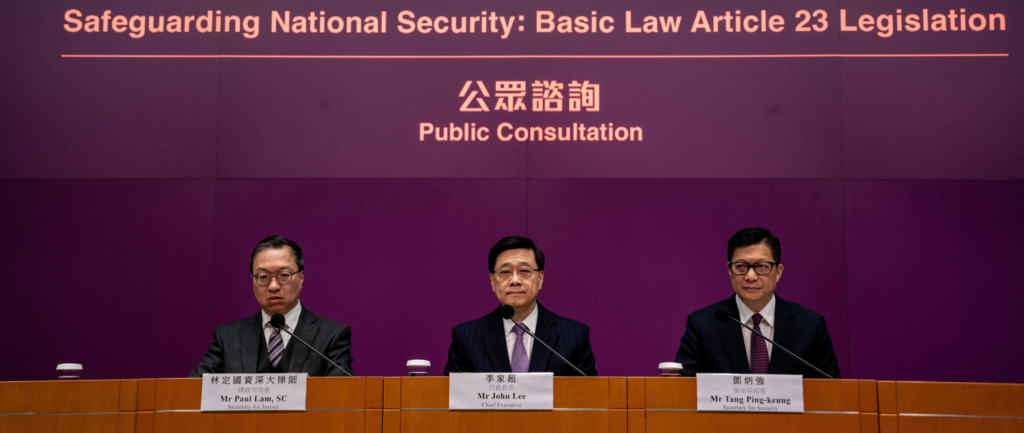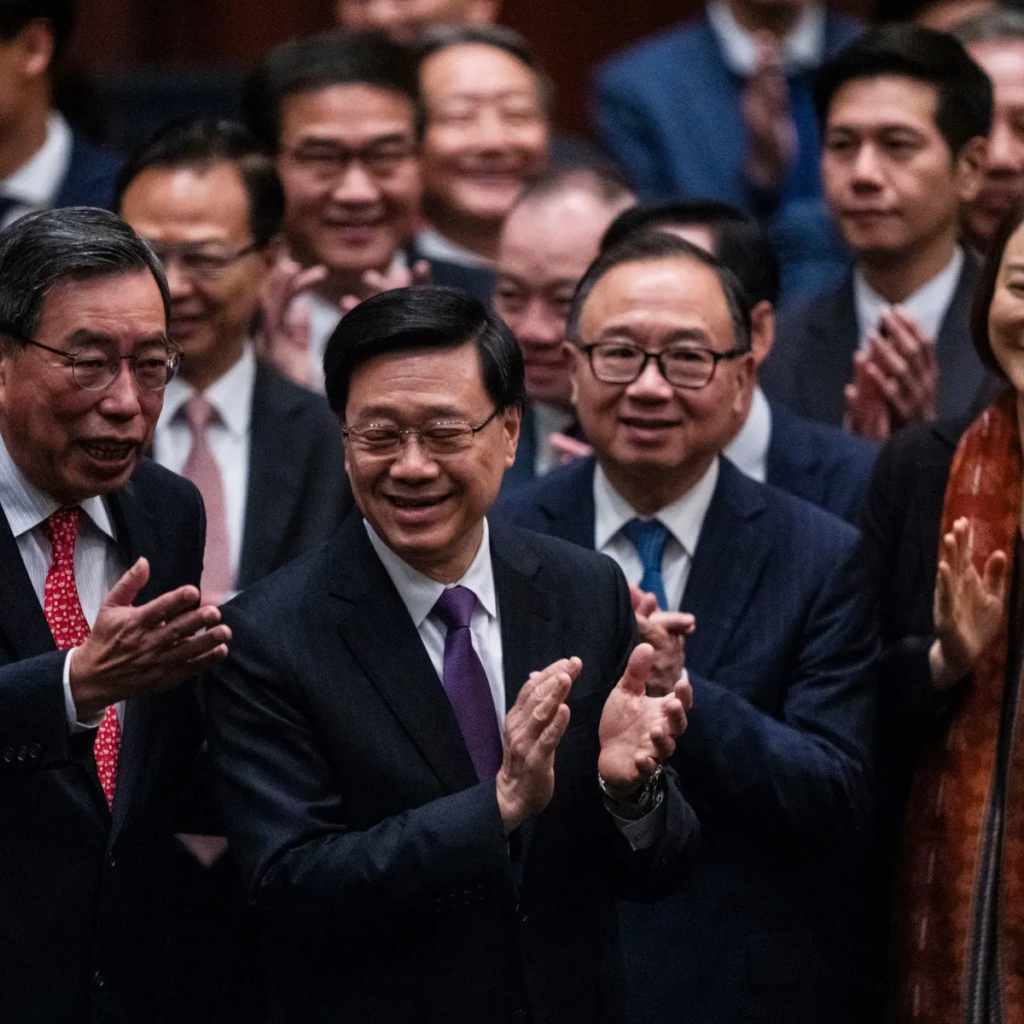On 19 March, Hong Kong lawmakers unanimously passed a security legislation that has the potential to not only undermine its reputation as an international business hub but also further threaten freedoms in the China-ruled city. Passed with a fortnight of it initially submitted in the Legislative Council on 08 March, the law, a.k.a Article 23, has brought forth a range of new national security crimes such as treason, espionage, external interference as well as theft of state secrets. Some of these also carry penalties of imprisonment, even up to life.
This ‘rushed’ legislation has been heavily and publicly criticised by countries across the globe, such as Australia, Japan, the United States, and Taiwan, among others. Some of these countries also updated their travel advisories for Hong Kong, advised their citizens to exercise caution if planning a trip to this SAR (Special Administrative Region) of China.

What Does the Law States?
The 212-page draft bill, which is being understood as an attempt by the pro-Beijing lawmakers to ‘plug’ national security loopholes, came into effect on 23 March. The law criminalises anything deemed as secession, subversion, terrorism, espionage, as well as external interference in Hong Kong’s affairs. The offences that endanger national security in any way are categorized to be punishable with life imprisonment. In case of espionage and sabotage (including cyber-attacks) the maximum punishment is imprisonment for up to 20 years.
Besides this, Article 23 also allows for ‘closed-door’ trials. Police powers are consequently expanded to permit detaining suspects for up to 16 days without charge and to restrict them from meeting lawyers. Even after bail has been granted the individual may have his/her movement and communication restricted. If organizations and companies are found to be ‘working for foreign forces’ they can be banned from operating in China’s SAR. Here, foreign or external forces could include foreign governments, political organizations or individuals; someone found guilty of engaging with these to interfere with national and/or local authorities can be sentenced to life imprisonment.

Furthermore, in any case of ‘unforeseen circumstances’ the Hong Kong legislators have complete authority to create and punish new offences. These rules will be applicable to actions that occur outside Hong Kong as well (by both residents and businesses).
Some other provisions to be mindful of are:
- Transfer of some cases to be tried in the Mainland. Some trials will be heard behind closed doors (in Hong Kong).
- A national security commission has to be established with a Beijing-appointed adviser, to enforce the laws.
- Ultimate power resides with Beijing on how the law should be interpreted. If the law is found to be conflicting with any Hong Kong law – China’s law takes priority.
- Foreign NGO’s and news agencies will be strictly monitored.
- Any destruction or damage to public transport facility will be categorized under terrorism.
- Those suspected of breaking the law will be put under heavy surveillance, they may be spied upon too.
- Those found guilty under Article 23 will no longer be allowed to stand for public office.
- The law is also applicable to non-permanent residents and people ‘from outside of Hong Kong who are not permanent residents’
Current Situation in Hong Kong
It is important to note that this is not the first time such a law was introduced to be signed into force. Back in 2003, lawmakers had attempted to pass Article 23 however, widespread public criticism (protest action by over 500,000 people) caused it to be scrapped completely.
This time though, the atmosphere in Hong Kong is very different. The public appears to have been muted due to a security crackdown. A vast majority of the city’s pro-democracy personalities are in prison, either convicted or facing charges under the 2020 national security law. The remaining have slipped away overseas. As a result, Hong Kong’s legislature is devoid of any pro-democracy opposition politician.
Public consultation for the new laws went on for just 28 days this time; two months short of the time allotted during the initial attempt in 2003. Referring to the feedback received during the consultation period, the government stated that 98% ‘showed support’ for the new law and only 0.7% expressed their dissatisfaction. What’s more, the legislature convened special sessions for the first and second reading of the proposed bill on 22 March and within three hours it was introduced.

This ‘fast-tracking’ was prompted by John Lee, Hong Kong’s Chief Executive (a.k.as the leader of the SAR), who told the lawmakers to pass the law ‘at full speed’.
Lee later stated that the law is necessary to ‘prevent black-clad violence’. This was clearly a reference to the massive and sometimes violent pro-democracy protests of 2019, when hundreds of thousands of Hong Kong citizens marched on the streets demanding greater autonomy from Beijing’s control.
A third reading of the law is scheduled however, a date or time is yet to be announced by the authorities.
Global Reaction to Article 23
While many countries are concerned that the law could inflict some serious damage to Hong Kong’s reputation as an international finance hub; many also believe that it could also undermine the ‘rights and freedoms’ of those in the city.
Australia, Japan, Taiwan, the United Kingdom, and the United States have very strongly voiced their opposition to the law. Some of these also recently updated their travel advisory to Hong Kong, advising their citizens to exercise caution if visiting the SAR of China. Protest actions have been launched in some countries namely, Australia, Britain, Canada, Japan, and the US. In Taiwan, dozens of Hong Kong, Taiwan, and Tibet activists gathered in popular tourist locations and publicly denounced the move by the Hong Kong administration.

Not only countries but several advocacy groups and Human Rights organizations have expressed concerns over some aspects of Article 23, such as the extensiveness of offences like ‘external interference’. According to Amnesty International’s China Director Sarah Brooks, this particular offence has the power to prosecute activists who interact/communicate with overseas individuals or organizations. No matter the subject of discussion such an interaction will be deemed as one ‘endangering national security’. Furthermore, a joint statement released by the overseas-based Hong Kong Democracy Council has called for sanctions on Hong Kong and Chinese officials involved in fast tracking the law and have additionally requested for a review of the current status of Hong Kong’s Economic & Trade Offices across the globe.
“It is alarming that such consequential legislation was rushed through the legislature through an accelerated process, in spite of serious concerns raised about the incompatibility of many of its provisions with international human rights law,” said the United Nations High Commissioner for Human Rights Volker Turk in a statement.
Response from Hong Kong & China
Nonetheless, despite such strong oppositions, authorities in Hong Kong and China have “strongly condemned such political manoeuvres with skewed, fact-twisting, scaremongering and panic-spreading remarks”. China also went on to slam the critics of the law, even accusing the UK and the European Union of being ‘hypocritical’ and exercising ‘double standards’.
The remarks came in when the British Foreign Secretary, David Cameron, mentioned that the legislation has compromised the Sino-British Joint Declaration, an internationally binding agreement signed in 1984 under which Beijing agreed to run Hong Kong under the ‘One country, Two systems’ principle.
“The United Kingdom has been making inflammatory and irresponsible comments on Hong Kong’s situation … it’s all due to the deep-rooted mindset as a coloniser and preacher,” said Beijing’s foreign affairs commissioner in a statement.

Domestically, Hong Kong Justice Minister has stated that citizens who engage in repeatedly reposting and expressing their agreement with overseas criticism will be regarded as guilty for inciting hatred against the authorities.
“Let’s say in extreme situations, if someone repeatedly reposted [overseas criticism] online and showed agreement – and that they added comments simply to incite other people’s hatred towards the Hong Kong and the central government – then, of course, there would be risk,” said Paul Lam in a televised interview.
However, what remains to be seen now is whether this draconian law, as being referred to by the international media, will successfully ‘secure (Hong Kong’s) prosperity and stability’ or will it pose as a profound challenge to the international order threatening to further deteriorate relations between China and the rest of the world.



